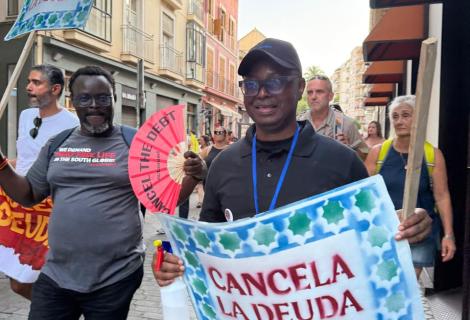At FFD4, ActionAid Ghana Champions a New Financial Deal for Climate and Economic Justice

In the heart of Seville, as global leaders, civil society, and development practitioners gathered for the Fourth International Conference on Financing for Development (FFD4), ActionAid Ghana stood tall — amplifying a message that can no longer be ignored: the current global financial system is broken, and it is trapping countries like Ghana in cycles of debt, underdevelopment, and climate vulnerability.
A Crisis Created Elsewhere, Paid for at Home
Ghana’s development prospects are under growing threat. Climate shocks are becoming more frequent and destructive, especially in the country’s northern farming communities. Meanwhile, external debt repayments now consume up to 50% of government revenue, money that could otherwise be used to fund schools, hospitals, and climate adaptation efforts.
Speaking from Seville, John Nkaw, Country Director of ActionAid Ghana, laid bare the injustice:
“Ghana is paying the price of a climate crisis it did not create and a financial system it did not design. These are not technical issues — they are political and deeply unjust. Our people deserve clean air, strong public services, and a future free from debt bondage. It’s time for a new global deal that is fair, green, and people-centred.”
Ghana’s Story is a Global Wake-Up Call
While the conference halls buzzed with diplomatic language, ActionAid Ghana brought real-life evidence from the communities it works with: Practically, climate has affected many in Ghana. In the Upper West and Upper East regions, erratic rainfall and floods are destroying livelihoods. Women and girls are disproportionately affected by public spending cuts, losing access to healthcare, education, and social protection. Furthermore, Ghana’s fiscal space is shrinking, limiting its ability to deliver on its climate commitments under the Paris Agreement.
In July alone, Ghana made another US$349.52 million Eurobond debt repayment, bringing its total payments in the first half of 2025 to US$1.17 billion. These figures, confirmed by the Ministry of Finance, underscore the unsustainable cost of servicing debt, even after the 2024 restructuring agreement.
With 35 years experience in promoting social and economic justice backed by grassroots engagement, ActionAid Ghana attended FFD4 with a clear agenda: reshape the rules of the global economy to serve people and the planet, not profits.
With a joint solidarity, AAG and and its global federation demanded that;
- A UN Convention on Sovereign Debt and Tax Justice to bring transparency and fairness to how debt is managed globally.
- The cancellation of illegitimate debts prevents countries like Ghana from investing in human development and climate resilience.
- A call for African voices to be meaningfully represented in key global financial institutions such as the IMF and World Bank.
Having began the discusssion from the grassroot level through campaigns and high profile dialogues, AAG work is translated into real impact evidently with its recent High-level national dialogues on climate financing and debt justice, which saw competitive participation of Government and Civil Society Organisations in Ghana.
Additionally, AAG has embarked on many research and policy briefs showing the links between austerity, public services, and women’s rights. Its recently published report " Gendered Tax report" which throw light on Tax inequalities amplifies AAG work. Again, through Community-led climate action, particularly through agroecology and sustainable land use practices, led by local rights programmes and donor-funded projects.
“The solutions to Ghana’s challenges will not come from recycled loans and donor-driven blueprints,” Nkaw noted. “They will come from courageous policy shifts, locally led innovations, and global systems that put justice before profit.”
Why This Matters for Donors and Development Partners
ActionAid Ghana believes that development cooperation must evolve. In a world marked by interlinked crises — climate, inequality, and conflict — donors and development actors must align with the growing movement for climate justice and financial fairness.
We call on all partners — bilateral, multilateral, philanthropic, and civil society — to:
- Invest in grant-based, climate-resilient financing
- Support locally owned solutions, particularly those led by women and young people
champion efforts to rebalance global power and governance systems
FFD4 Is Just the Beginning. For ActionAid Ghana, the FFD4 conference was not a moment of diplomacy alone — it was a turning point for solidarity. As global attention turns toward reforming the international financial architecture, our message remains firm: Ghana and the Global South need bold, systemic change, not band-aids.